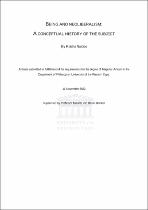| dc.contributor.advisor | van Bever Donker, Maurits | |
| dc.contributor.author | Naidoo, Kiasha | |
| dc.date.accessioned | 2023-05-11T07:42:01Z | |
| dc.date.available | 2023-05-11T07:42:01Z | |
| dc.date.issued | 2022 | |
| dc.identifier.uri | http://hdl.handle.net/11394/9917 | |
| dc.description | Masters of Art | en_US |
| dc.description.abstract | The idea of neoliberalism, as both a guiding principle for economic policy decisions and a governing rationality, is a pertinent issue of our time. The concept itself is often used to describe the contemporary mode of political economy but when we look closer, it is notoriously elusive. Scholars such as Michel Foucault and Wendy Brown seek to conceptualize neoliberalism as a governing rationality. What these scholars share is a reading of neoliberal governmentality in terms of the subject. In social and political philosophical critiques of neoliberalism which inherit from this Foucauldian line of thought, the subject is a central figure. However, thinking on the subject did not begin with a consideration of neoliberalism, it has a long philosophical history. I discuss this through a conceptual history of the subject and in doing so, understand the neoliberal subject as another iteration of subjectivity. | en_US |
| dc.language.iso | en | en_US |
| dc.publisher | University of the Western Cape | en_US |
| dc.subject | Humanity | en_US |
| dc.subject | Neoliberalism | en_US |
| dc.subject | Politics | en_US |
| dc.subject | Race | en_US |
| dc.subject | Ontology | en_US |
| dc.title | Being and neoliberalism: A conceptual history of the subject | en_US |
| dc.rights.holder | University of the Western Cape | en_US |

